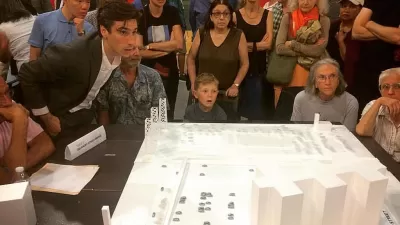Economic crises tend to manifest themselves in specific design trends, especially in the field of architecture. This latest recession has spurred the age of Do-It-Yourself architecture and urbanism.
In the first part of a four-part series for Places, Mimi Zeiger looks at how the trend of DIY urbanism is playing out.
"Our current recession is inspiring its own strategies and tactics: It's increasingly a catch-all for a host of urban interventions. This is a trend that I like to describe with a mouthful of a title: Provisional, Opportunistic, Ubiquitous, and Odd Tactics in Guerilla and DIY Practice and Urbanism. With this verbaciousness, I hope to capture the tactical multiplicity and inventive thinking that have cropped up in the vacuum of more conventional commissions. These days vacant lots offer sites for urban farming, mini-golf, and dumpster pools. Trash recycles into a speculative housing prototype (see the Tiny Pallet House). Whether it's The Living's Amphibious Architecture or Mark Shephard's Serendipitor, the built environment speaks through mobile devices. Retail spaces hit by the recession are fodder for reinvention, as the art organization No Longer Empty transforms unleased storefronts into temporary galleries. Even the street itself is reclaimed. REBAR's annual initiative, Park(ing) Day, urges global participants to use a pranksters wit to turn parking spaces into pocket parks, one quarter at a time."
FULL STORY: The Interventionist's Toolkit

Planetizen Federal Action Tracker
A weekly monitor of how Trump’s orders and actions are impacting planners and planning in America.

Congressman Proposes Bill to Rename DC Metro “Trump Train”
The Make Autorail Great Again Act would withhold federal funding to the system until the Washington Metropolitan Area Transit Authority (WMATA), rebrands as the Washington Metropolitan Authority for Greater Access (WMAGA).

The Simple Legislative Tool Transforming Vacant Downtowns
In California, Michigan and Georgia, an easy win is bringing dollars — and delight — back to city centers.

The States Losing Rural Delivery Rooms at an Alarming Pace
In some states, as few as 9% of rural hospitals still deliver babies. As a result, rising pre-term births, no adequate pre-term care and "harrowing" close calls are a growing reality.

The Small South Asian Republic Going all in on EVs
Thanks to one simple policy change less than five years ago, 65% of new cars in this Himalayan country are now electric.

DC Backpedals on Bike Lane Protection, Swaps Barriers for Paint
Citing aesthetic concerns, the city is removing the concrete barriers and flexposts that once separated Arizona Avenue cyclists from motor vehicles.
Urban Design for Planners 1: Software Tools
This six-course series explores essential urban design concepts using open source software and equips planners with the tools they need to participate fully in the urban design process.
Planning for Universal Design
Learn the tools for implementing Universal Design in planning regulations.
Smith Gee Studio
City of Charlotte
City of Camden Redevelopment Agency
City of Astoria
Transportation Research & Education Center (TREC) at Portland State University
US High Speed Rail Association
City of Camden Redevelopment Agency
Municipality of Princeton (NJ)




























